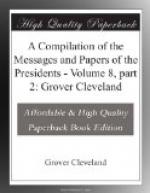JAMES MADISON.
JANUARY 31, 1817.
To the Senate and House of Representatives of the United States:
The envoy extraordinary and minister plenipotentiary of His Most Christian Majesty having renewed, under special instructions from his Government, the claim of the representative of Baron de Beaumarchais for 1,000,000 livres, which were debited to him in the settlement of his accounts with the United States, I lay before Congress copies of the memoir on that subject addressed by the said envoy to the Secretary of State.
Considering that the sum of which the million of livres in question made a part was a gratuitous grant from the French Government to the United States, and the declaration of that Government that that part of the grant was put into the hands of M. de Beaumarchais as its agent, not as the agent of the United States, and was duly accounted for by him to the French Government; considering also the concurring opinions of two Attorneys-General of the United States that the said debit was not legally sustainable in behalf of the United States, I recommend the case to the favorable attention of the Legislature, whose authority alone can finally decide on it.
JAMES MADISON.
FEBRUARY 3, 1817.
To the Senate and House of Representatives of the United States:
The Government of Great Britain, induced by the posture of the relations with the United States which succeeded the conclusion of the recent commercial convention, issued an order on the 17th day of August, 1815, discontinuing the discriminating duties payable in British ports on American vessels and their cargoes. It was not until the 22d of December following that a corresponding discontinuance of discriminating duties on British vessels and their cargoes in American ports took effect under the authority vested in the Executive by the act of March, 1816. During the period between those two dates there was consequently a failure of reciprocity or equality in the existing regulations of the two countries. I recommend to the consideration of Congress the expediency of paying to the British Government the amount of the duties remitted during the period in question to citizens of the United States, subject to a deduction of the amount of whatever discriminating duties may have commenced in British ports after the signature of that convention and been collected previous to the 17th of August, 1815.
JAMES MADISON.
FEBRUARY 6, 1817.
To the Senate and House of Representatives of the United States:




